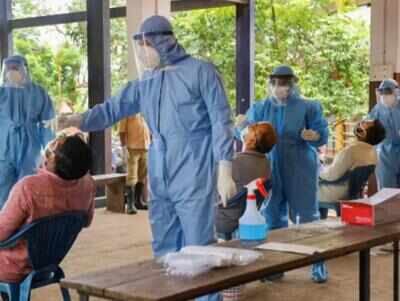Top Searches
- News
- India News
- Covid-19: ‘No. of cases, exposure duration affect spread’
Covid-19: ‘No. of cases, exposure duration affect spread’

Image used for representational purpose only
NEW DELHI: The coronavirus is also an airborne infection but the chance of picking up SARS-CoV-2 in the air is directly related to the number of Covid-19 positive cases in a room, their symptomatic status, and the duration of exposure, a new study by the Council of Scientific and Industrial Research (CSIR) shows.
The study, yet to be peer-reviewed, underlines the importance of ventilation, physical distancing and mask wearing. While the findings suggest that chances of catching airborne infection is high in closed indoors and in a hospital setting where there are many positive patients, it highlights that the demarcation of hospital areas into Covid and non-Covid zones is a successful strategy to prevent cross infections.
In neutral environmental conditions, the virus does not seem to spread farther away from the patients, especially if they are asymptomatic, giving objective evidence for the effectiveness of physical distancing in curbing the spread of the virus.
The study — published in pre-print server medRxiv — analysed air samples collected from various Covid and non-Covid areas of hospitals in Hyderabad and Mohali as well as from closed rooms occupied by Covid-19 patients to understand air transmission characteristics of SARS-CoV-2 and risks for healthcare personnel and visitors to hospitals.
"It is evident that the spread of the pandemic may be largely attributed to non-compliance of Covid-19 safety guidelines on the part of the people. A right amount of caution with courage backed up by sound scientific principles is the need of the hour," the study said.
The findings of the study show the virus does not travel much in the air in neutral environmental conditions (ambient temperature and humidity with no perceived air flow), especially if the duration of exposure is short. The virus could not be picked up at a distance of even four feet when Covid-positive individuals spent a short time of around 20 minutes in the room. The samples collected at 8 feet and 12 feet subsequently were also negative. In a situation where three people with mild symptoms were in a room for at least an hour, the virus could be detected at the same place immediately after their departure.
Researchers of the study say the findings objectively reassure people that advocated preventive measures would largely be successful in preventing the infection and urge the governments to continue promoting the same.
"Short-term travel and resumption of economic activity can be safe if adequate measures are taken," it said.
The study, yet to be peer-reviewed, underlines the importance of ventilation, physical distancing and mask wearing. While the findings suggest that chances of catching airborne infection is high in closed indoors and in a hospital setting where there are many positive patients, it highlights that the demarcation of hospital areas into Covid and non-Covid zones is a successful strategy to prevent cross infections.
In neutral environmental conditions, the virus does not seem to spread farther away from the patients, especially if they are asymptomatic, giving objective evidence for the effectiveness of physical distancing in curbing the spread of the virus.
The study — published in pre-print server medRxiv — analysed air samples collected from various Covid and non-Covid areas of hospitals in Hyderabad and Mohali as well as from closed rooms occupied by Covid-19 patients to understand air transmission characteristics of SARS-CoV-2 and risks for healthcare personnel and visitors to hospitals.
"It is evident that the spread of the pandemic may be largely attributed to non-compliance of Covid-19 safety guidelines on the part of the people. A right amount of caution with courage backed up by sound scientific principles is the need of the hour," the study said.
The findings of the study show the virus does not travel much in the air in neutral environmental conditions (ambient temperature and humidity with no perceived air flow), especially if the duration of exposure is short. The virus could not be picked up at a distance of even four feet when Covid-positive individuals spent a short time of around 20 minutes in the room. The samples collected at 8 feet and 12 feet subsequently were also negative. In a situation where three people with mild symptoms were in a room for at least an hour, the virus could be detected at the same place immediately after their departure.
Researchers of the study say the findings objectively reassure people that advocated preventive measures would largely be successful in preventing the infection and urge the governments to continue promoting the same.
"Short-term travel and resumption of economic activity can be safe if adequate measures are taken," it said.
FacebookTwitterLinkedinEMail
Start a Conversation
end of article
Quick Links
Coronavirus in MumbaiFarm bill 2020Farmers protestCoronavirus in DelhiCoronavirus in BangaloreCoronavirus symptomsCoronavirus in IndiaWest Bengal elections 2021Coronavirus NewsSolar EclipseNPRWhat is NRCCAB BillCAB and NRCAssam election 2021Podcast newsLok SabhaTamil Nadu Election 2021CongressBJP newsKerala Elections 2021Indian ArmyISRO newsSupreme Court

